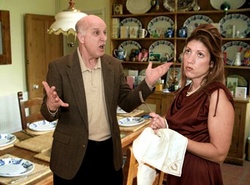P.T.D.'s 'Table Manners' may be too polite

Rick Katon and Darcy MacConnell star in "Table Manners."
Photo by Paul Demyanovich
The first thing you notice about P.T.D. Productions’ staging of Alan Ayckborn’s “Table Manners” - part of an interwoven trilogy of plays called “The Norman Conquests” (P.T.D. is presenting the other two plays, “Living Together” and “Round and Round the Garden,” as concert readings) - is its beautifully executed dining room set, designed by Joe York and Jan Carpman, with props/set pieces by Joan Boonin, Lois Kuznets Dowling, and Jim Dowling.
Indeed, “Manners”’ English country home looks so cozy and tasteful that the quiet chaos that soon invades it - when three middle-aged siblings, two spouses, and a ubiquitous neighbor spend a weekend together - ultimately feels like some kind of cosmic correction, pitting the minutiae that humans are able control against the things we can’t; which is to say, other people.
Annie (Mary Hopper) has long lived in her family’s country house while taking care of her ailing mother and spending time with the painfully-awkward-but-sweet veterinarian, Tom (Tod Barker), who lives next door. Because Annie wants a weekend away for a brief vacation, her brother Reg (Rick Katon) and his highly-strung wife Sarah (Darcy MacConnell) arrive to assume Annie’s caretaking duties; but when Annie admits that her plan is to spend a “dirty weekend” with Norman (Eric Bloch), the aspiring-lothario husband of Annie’s career-minded sister Ruth (Alice Fell), all six of these unhappy people end up spending the weekend together at the family’s country house.
The notorious Norman doesn’t appear until the second half of the first act; and while there’s a good bit of build-up leading up to this reveal, the character never seems as larger-than-life as we’re initially led to expect.
Yes, Norman sometimes talks a mile a minute (which gave the Bloch some trouble Friday night); he oozes a desperate desire to be liked; and in P.T.D.’s production, he wears some sublimely over-the-top, loud pajamas for his first appearance on stage; but perhaps because “Manners” is a quintessentially English family comedy, its characters, conflicts, and humor often feel too restrained and muted for the audience to fully engage with.
For example, although it would seem that a woman running off with her sister’s husband for a weekend would be enormously scandalous, nearly all the characters learn of the plan and essentially shrug their shoulders. Even Norman’s wife seems unfazed by the news, which led me to wonder: if she doesn’t care, why on earth should I?
That having been said, Carpman, the show's director, guides her hard-working cast quite ably, and MacConnell in particular succeeds brilliantly as the brittle, controlling Sarah, who nearly collapses when her in-laws refuse to sit around the dinner table in the proper, alternating-genders fashion.
Fell and Hopper do good work also, but Fell wears a microphone for the show, and in her first scene on Friday night, the mic distractingly picked up the rustle of her clothing, as well as her cereal-chewing. And while moments of wit are recognizable in Ayckborn's script, many of the jokes in P.T.D.'s production never quite land with the audience.
Generally, however, the two hour production (and the play itself) gets better in its second half, taking a somewhat surprising turn after showcasing a tense family dinner.
During that meal, Norman insists at one point that he’s “just making small talk,” to which Ruth replies, “Not quite small enough.” Yet I constantly found myself wanting everything in “Manners” to be bigger - bigger conflicts, bigger characters, bigger laughs, bigger stakes. Perhaps “Manners” is, at its heart, just too mild-mannered for its own good.
Jenn McKee is the entertainment digital journalist for AnnArbor.com. Reach her at jennmckee@annarbor.com or 734-623-2546, and follow her on Twitter @jennmckee.

